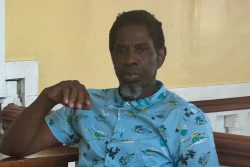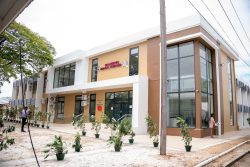It was reported last week that the government holding company National Industrial and Commercial Investments Limited (NICIL) injected a further US$16 million into the Marriott project. When questioned about the origins of the funds, the Director, Mr Winston Brassington, told the press these funds are not derived from taxation; that the funds come from dividends and sale of NICIL assets, which by the way are the assets of the people of Guyana.
On a technical level he is right that the funds do not come from taxation. However, NICIL is a government holding company. It was created during the Hoyte era to oversee the privatization of state assets. Under Hoyte some of the prices paid for the people’s assets were steeply discounted and valuations highly suspicious. One only needs to go back to the newspaper reports of that time to get a feel for how privatizations were done. Under the Jagdeo regime NICIL assumed a role of patronage channelling the people’s assets to selected friends. Moreover, in the Jagdeo period NICIL has also pursued investments or projects that don’t seem to be based on sound economic logic.
NICIL manages the assets of the people. The funds belong to the people of Guyana. NICIL is a government holding company and as such is accountable to Parliament. Every cent of revenue earned by NICIL – whether through sale of assets, capital gains or dividends – belongs to the people of Guyana. Mr Brassington is working on their behalf.
 I listened to Mr Jagdeo’s press conference which he used to clarify his statements at Babu Jaan. His statements include some truths, several outrageous lies and lots of half-truths. But one statement which stood out is his observation that Guyana can never move forward or develop without political cooperation. That’s a statement consistent with one of the recurring themes of Development Watch.
I listened to Mr Jagdeo’s press conference which he used to clarify his statements at Babu Jaan. His statements include some truths, several outrageous lies and lots of half-truths. But one statement which stood out is his observation that Guyana can never move forward or develop without political cooperation. That’s a statement consistent with one of the recurring themes of Development Watch.
Guyana faces numerous challenges including its harsh geography, small market, dispersed settlement patterns (thus compounding the small market), not being an entrepot or existing next to one, and several other barriers that add a layer of cost for the producer trying to take goods to market. So political conflicts and mutual strategy of sabotage only make things worse and increase the difficulty of entrepreneurs, many of whom have chosen to migrate particularly from the 1970s when costly and inefficient Cooperative Socialism dominated economic life.
A consensus based approach and cooperation were the last things on the mind of Mr Jagdeo as he deployed NICIL into various investment projects. There was never any overarching principle under which NICIL would operate. We could never discern whether it operates on a model of efficiency as it chooses its investments. Nor was there any hint that fairness and transparency were part of its ethos. Do its investments complement existing private businesses or do they compete unfairly? Take for example the Marriott project. Jagdeo was instrumental in getting several investors to respond by taking risks to build hotels for Cricket World Cup. That was an important accomplishment of his regime.
However, he followed this up by using the resources of the people to build the Marriott which will compete with Pegasus and some others that invest private funds. NICIL has never justified the new hotel on any objective framework of capital budgeting. Information released to the public took the form of either lies or obfuscations. Now a consensus and complementary approach would have used NICIL’s funds as capital injection into possibly two or three existing brands in return for the hotels upgrading to 5-star status.
They could have gone to Parliament and explain why the country needs possibly two high quality 5-star hotels; that some CEOs will never even visit a potential investment destination without at minimum a 5-star hotel. Eventually NICIL could have sold its shares on the local stock market once the upgraded hotels succeed. Privatization through the stock market is a useful form of socialism as it gets a wide cross-section of Guyanese and CARICOM nationals and institutional investors to own assets.
The next government will need to reorganize NICIL by proposing some transparent principles under which it will operate. Will Mr Jagdeo do this since the PPP announced he will now be in charge of all aspects of economic planning should that party win the election?
What are the plans of APNU-AFC as it relates to NICIL? At minimum NICIL should act more as an investment bank providing serious technical investment appraisals and underwriting investments. Furthermore, NICIL would have to go deeper assuming the role of a state venture capitalist given that there is not going to be a private investment bank or a class of venture capitalists emerging in Guyana any time soon.
NICIL will have to be staffed with highly trained technicians with broad interdisciplinary skills ranging from economics, finance, engineering, geography, the sciences to other subjects. If the politicians decide to staff NICIL with political hacks, expect more policy failures like the Marriott and Skeldon sugar factory. The technicians would have to be able to assess risks and value carefully future streams of cash.
They will need to be accountable to the Parliament. In addition, one can only hope that the next Parliament would know which questions to ask these technicians. Other societies have had similar organizations in their formative years of development. Let’s see if Guyanese can do same.
In conclusion, as the May 11 election draws close it would be helpful to read about the policies of the PPP/C and APNU-AFC relating to NICIL. Development Watch will be interested in their views regarding how NICIL could be restructured to perform according to the principles of fairness, transparency, efficiency and business complementarity.
Comments: tkhemraj@ncf.edu









